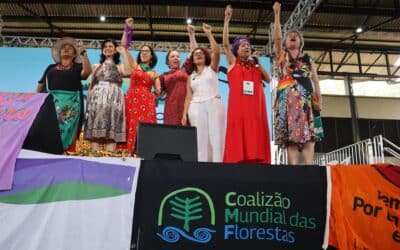Press Release African Center for Biosafety – 3 April 2013
Civil society organisations from the SADC region, and around the world have condemned the SADC draft Protocol for the Protection of New Varieties of Plants (Plant Breeders’ Rights) as spelling disaster for small farmers and food security in the region. These groups, representing millions of farmers in Africa and around the world have submitted their concerns to the SADC Secretariat. They are calling for the rejection of the Protocol and urgent consultations with farmers, farmer movements and civil society before it’s too late.
According to the groups, the Protocol is inflexible, restrictive and imposes a “one-size-fits-all” plant variety protection (PVP) system on all SADC countries irrespective of the nature of agricultural systems, social and economic development. It is modelled after the 1991 International Convention for the Protection of New Varieties of Plants (UPOV 1991), an instrument which was developed by industrialized countries to address their own needs. UPOV 1991 grants extremely strong intellectual property right protection to plant breeders, and disallows farmers from continuing their customary practices of freely using, exchanging and selling farm-saved seeds.
According to Moses Shaha, regional chairman for the East and Southern African small-scale Farmers’ Forum (ESAFF): “The proposed legislation gives big-business breeders significant rights, but in doing so, disregards and marginalizes small farmers and their plant varieties. It fails to recognize that small-scale farmers and their customary practices of freely exchanging and re-using seed for multiple purposes, constitute the backbone of SADC’s agricultural farming systems.”
About half of SADC members are Least Developed Countries (LDCs) and are not currently under any international obligation to put in place any such PVP system. Indeed, the majority of SADC members have limited or no experience with PVP systems, or the impact these systems will have on food security, farmers, farming systems and livelihoods in the region.
According to Elizabeth Mpofu, a small farmer from Zimbabwe: “Small farmers in Africa play a vital role in keeping food costs down, and contribute immensely to the development of locally appropriate and adapted seeds, and to the diversity of crops. Any PVP system that fails to support and promote these farmer managed systems, and instead adversely impacts on them, is clearly a recipe for disaster for the region’s farmers.”
Like UPOV 1991, the Protocol is severely lacking in flexibilities to allow vulnerable states to address their particular socio-economic problems. The Protocol imposes a “one grant system” whereby the SADC Plant Breeders’ Rights Office will have the full authority to grant and administer breeders’ rights on behalf of all SADC members. “This top-down approach effectively undermines the rights of SADC member states to take any decision related to the protected plant varieties; decisions that are at the very core of national socio-economic development and poverty reduction strategies. The Protocol also does not contain concrete measures to prevent misappropriation of plant genetic resources and does not live up to international commitments of the majority of SADC members to promote the sustainable use of plant genetic resources and plant breeding with the participation of farmers” pointed out Andrew Mushita, of the Community Trust for Development and Technology, in Zimbabwe.
“The whole rationale and underlying premise for the Protocol is unknown to us because we, as civil society, have been locked out of the process. What specific consultations have taken place, and with whom? What data and impact assessments have guided the development of the Protocol?” asks Mariam Mayet, of the African Centre for Biosafety.
The submission can be downloaded at www.acbio.org.za
Contact:
Moses Shaha: moses_388ke@yahoo.com
Elizabeth Mpofu: ezimmpofu@gmail.com
Andrew Mushita: andrew@ctdt.co.zw
Mariam Mayet: mariammayet@mweb.co.za
Notes to Editors:
SADC = Southern African Development Community. It is an inter-governmental organisation. Its goal is to further socio-economic cooperation and integration as well as political and security cooperation among 15 southern African states. The 15 members states are: South Africa, Mozambique, Malawi, Botswana, Lesotho, Namibia, Swaziland, Mauritius, Madagascar, Tanzania, Zambia, Zimbabwe, Democratic Republic of Congo, Seychelles, and Angola.
Agriculture is the primary source of subsistence, employment and income for a majority of SADC’s population, which consists mainly of the rural poor. The agricultural population in the southern and eastern African regions ranges from 39% in Lesotho to 76% in Mozambique in 2010[1] , and constitutes more than half the population in more than half the countries in southern and eastern Africa. Farms of less than 2 hectares account for 70-90% of all farms in most African countries.[2]
Agriculture is also fundamental to addressing nutrition and food security issues, which remain a critical challenge in the SADC region. The current status of food insecurity in the region can be measured by the prevalence of undernourishment, which is “high” to “very high” (i.e. above 25% of the population) in 8 SADC countries (DRC, Angola, Malawi, Madagascar, Mozambique, Tanzania, Zambia and Zimbabwe).[3] Further progress towards Millennium Development Goal 1 to halve between 1990 and 2015, the proportion of people who suffer from hunger has been mixed in the SADC region, with 7 SADC countries not being on track: (Tanzania, the DRC, Botswana, Lesotho, Swaziland, Zambia and Madagascar).[4]Variable weather patterns as a result of climate change including increased incidence of drought and floods, are key factors for continuing chronic vulnerability and food insecurity, particularly in the rural areas.
An estimated 80% of all seed used in Africa originates from the informal seed systems (also known as “farmer-managed seed systems”).[5] or many crops, the estimate is close to 100%.[6] Farmers rely heavily on farm saved seed, exchanges with relatives and neighbors, bartering with other farmers or local markets to access seeds. Reliance on informal seed sources is independent of whether farmers cultivate local or modern varieties.[7] The reasons for this include: inadequate access to markets; the market channels are unfavourable to farmer living in remote areas; limited access to financial resources or credit to buy seeds; the inability of formal system to provide timely and adequate access to quality seeds of improved varieties and to varieties that are specifically adapted to local conditions.[8]
[1]World Bank, “World Databank”, http://databank.worldbank.org/data/home.aspx
[2]Hazell, P. & Poulton, C. 2007 “All-Africa review of experiences with commercial agriculture: case study on food staples”, background paper for World Bank’s Competitive Commercial Agriculture in Sub-Saharan Africa study, p.12
[3]SADC Regional Agricultural Policy, Priority Policy Issues and Interventions, July 2012, p.8
[4]SADC Regional Agricultural Policy, Priority Policy Issues and Interventions, July 2012, p. 8
[5]Smale, M., Byerlee, D. & Jayne, T. 2011 “Maize revolutions in sub-Saharan Africa”. Policy Research Working Paper 5659. Washington DC, World Bank, Development Research Group, p.7
[6] Louwaars, N.P., and De Boef, W. S., “Integrated Seed Sector Development in Africa: A Conceptual Framework for Creating Coherence Between Practices, Programs and Policies, Journal of Crop Improvement 26:39-59, 2012
[7] Louwaars, N.P., and De Boef, W. S., “Integrated Seed Sector Development in Africa: A Conceptual Framework for Creating Coherence Between Practices, Programs and Policies, Journal of Crop Improvement 26:39-59, 2012
[8] Louwaars, N.P., and De Boef, W. S., “Integrated Seed Sector Development in Africa: A Conceptual Framework for Creating Coherence Between Practices, Programs and Policies, Journal of Crop Improvement 26:39-59, 2012




